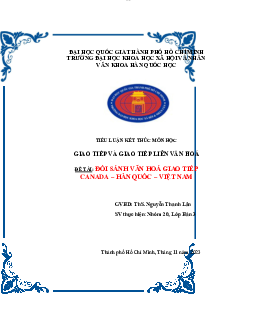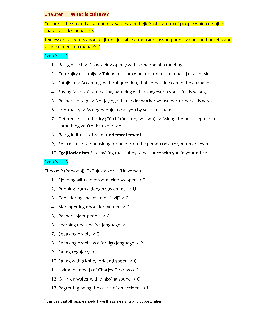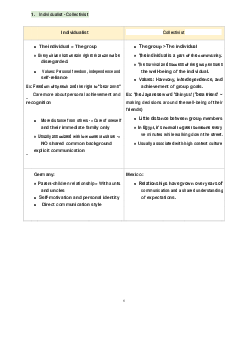







Preview text:
TEST 1
There are FOUR sections in this test paper.
WRITE YOUR ANSWERS ON THE ANSWER SHEET.
I. Choose the best answer to each of the following questions. (1 point)
1. Which of the following countries is considered a high-context culture? A. Australia B. Germany C. The USA D. Spain
2. Which of the following countries is the most individualistic? A. South Korea B. Mexico C. Australia D. India
3. On which cultural dimensions are all these Asian countries: Japan, South Korea,
Thailand and India similar? A. Masculinity
C. Long Term Orientation B. Power distance
D. Uncertainty Avoidance
4. What do people in India say to greet each other? A. Namaste B. Hola C. Salut D. Konnichiwa
5. The …………….. people are indirect communicators. A. Vietnamese B. Korean C. Thai D. All are correct
6. ……………… has the highest indulgence index. A. Mexico B. Germany C. Spain D. Thailand
7. Which language below is similar to Vietnamese in using tones to distinguish the meaning of words? A. English B. German C. Spanish D. Thai
8. Which of the Vietnamese values is reflected in the saying "Blood is thicker than water". A. Good reputation C. Love of learning
B. Allegiance to the family D. Respect
9. ……………….. is the Vietnamese indigenous religion created in the 20th century. A. Buddhism B. Caodaism C. Christianity D. Islam
10. Direct eye contact is expected in communication with the ………………… A. Vietnamese B. Koreans C. Japanese D. Germans
II. Decide whether each of the following statement is TRUE or FALSE. (1 point)
1. Because of universal behavior, not everything about people in a new culture is
going to be different; some of what you already know about human behavior is
going to apply in your host country. lOMoAR cPSD| 40749825
2. Within a low-context culture, interactants primarily will look to the
physical, sociorelational, and
3. perceptual environment for information.
4. In masculine cultures, status purchases (expensive watches, jewelry) are
common and in feminine cultures, people buy more products for the home.
5. Communication tools, such as punctuation marks and emojis, are greatly used
by high-context users than low-context users.
6. It is always important to maintain eye contact with people around the world.
7. Indirect communicators believe that saving face is more important than
giving a true response.
8. A low Masculinity ranking indicates that females are treated equally to
males in all aspects of the society.
9. "In the Middle East, women have a lesser status than men" is an example of stereotype.
10. Low context cultures tend to be more collectivistic than high context cultures.
11. "There are some people in this world that will not like you, no matter what
you do" is spoken by those with an external locus of control. III. MATCHING: (1 point)
Match the terms or phrases below with their definitions/situations/characteristics. 1. Monochronic
a) The belief that your own cultural background is superior.
2. Individualist
b) People emphasize quick results.
3. High power distance
c) A deal is a deal, until circumstances change.
4. Ethnocentrism
d) People are more likely to pursue their personal goals.
5. Internal locus of control
e) A strong hierarchical structure within organizations
6. High uncertainty avoidance
f) People follow an internal clock.
7. Short-term orientation
g) My success is attributed to my own efforts.
h) People formulate rules, detailed schedules and refuse to 8. Particularist tolerate deviance.
i) Personal talk should be saved for after working hours or 9. Direct communication during lunch.
j) You may have to read between the lines to understand 10.
Indirect communication what someone is saying.
k) It's best to tell it like it is. lOMoAR cPSD| 40749825
IV. SITUATIONS: (2 points)
1. Read the following dialogue between Bob (American) and Carlos (Spanish)
and briefly answer the questions that follow.
BOB: We got a bit behind on this. The deadline is Wednesday.
CARLOS: Yes. We'll have to clear our calendar and work on it first thing next week.
BOB: That'll be cutting it a bit close, don't you think?
CARLOS: What other choice do we have?
BOB: We could come in on Saturday.
CARLOS: I never work at weekend. Sorry. BOB (sighs)
Q1. What different attitudes toward work are reflected in the dialogue?
_________________________________________________________________________
_________________________________________________________________________
_________________________________________________________________________
_________________________________________________________________________
_________________________________________________________________________
_________________________________________________________________________
Q2. If you were Bob, what would you do (or say) instead of sighing?
_________________________________________________________________________
_________________________________________________________________________
_________________________________________________________________________
_________________________________________________________________________
_________________________________________________________________________
_________________________________________________________________________
2. Read the following incident and briefly answer the questions that follow.
A manufacturing company wanted to boost its flagging exports to India. Ronald, a
young German marketing manager with a lot of experience in the Berlin office of the
organization was seconded to the company's Mumbai headquarters for six months in
order to help with a new marketing project. Ronald several weeks researching the
marketing department's methods and talking to his counterparts. Eventually, he drew
up a number of clear proposals for boosting Indian sales, which he intended to
present at a senior management meeting. During the meeting Ronald explained what
the problems were and what needed to be done to solve them. lOMoAR cPSD| 40749825
At the end of the meeting Ronald asked if anyone had any comments or suggestions,
and was a little surprised when everyone kept silent. A week later Ronald was
transferred back to Berlin, even though he still had three months of his secondment
to serve. Shortly afterwards, Ronald's manager in Berlin received a memo from the
head office suggesting that Ronald be moved to a 'less sensitive' position in the
company where he did not have to deal with clients or senior management.
Q3. How would you explain the differences or the causes of misunderstanding?
_________________________________________________________________________
_________________________________________________________________________
_________________________________________________________________________
_________________________________________________________________________
_________________________________________________________________________
_________________________________________________________________________
_________________________________________________________________________
_________________________________________________________________________
Q4. What could be some solutions to this situation?
_________________________________________________________________________
_________________________________________________________________________
_________________________________________________________________________
_________________________________________________________________________
_________________________________________________________________________
_________________________________________________________________________
_________________________________________________________________________
_________________________________________________________________________ lOMoAR cPSD| 40749825 TEST 2
There are FIVE sections in this test paper.
WRITE YOUR ANSWERS ON THE ANSWER SHEET.
Part 1 (1pt) Choose the best answer to each of the following questions
1. Which of the following is "blossfial igorice among the stages of cultural awareness?
A. You know you don't know, C. You know you know
B. You don't know you know
D. You don't know you don't know
2. On first acquaintance, how should you address a Japanese? A His/her full name C. His/her sumame
B. His/her first name combined with the
D. His/her sumarine combined with the honorific-san honorifico-san
3. In India, if one person nods, what does he/she mean?
A "I disagree with you on this."
C."We're on the same page."
B. "We should hang out sometimes."
D. "Til talk to you later"
4. In America, opening a gift in front of the gift-giver is considered to be A. courteous B. rude C. hospitable D. impolite
5. In English, how do we call a lie aiming to avoid hurting someone's feelings? A. A black lie B. A pink lie C. A white lie D. A blue lie
6. Which of the following is an essential part of business practice in Australia?
A. Good communication skills C. Proper protocol B. Punctuality D. Teamwork
7. In Middle East, what is a taboo when eating? A. Leaving food
C. Eating with a full mouth
B. Using your left hand D. Making noises
8. The wai is the typical greeting in A. China B. Japan C. Thailand D. Korea
9. The business communication style in Britain is characterized as being …………………… A. Direct B. Indirect C. Cucular D. Bowling
10. In America, what topic should you avoid in small talks? A. Sex C Religion B. Personal hobbies D. Both A and C lOMoAR cPSD| 40749825
Part 2 (1p) Decide whether each of the following statement is TRUE or FALSE Statement True False
1. In individualistic societies, a mother asks her kids what
they want to wear today.
2 Universalists behave differently in a given situation
depending on the circumstances
3 Vietnam is a collectivistic society accepting
hierarchy and avoiding uncertainty.
4. The USA is an individualistic, masculine, and indulgent nation.
5. In the stage of conscious incompetence, you are aware
of the cultural differences between you and others from
other cultures, but you know little about them.
6. In low-context cultures, what is not said may be
more important than what is.
7. When an indirect communicator says yes, it may mean (5) he hears you.
8. It is always important to maintain eye contact with
people around the world
9. Masculine nations highly value competition and achievement
while feminine ones treasure harmony and quality of life.
10. "Those figures are not completely accurate" is more likely
to be said by an indirect communicator.
Part 3 (1pt) Match the dimensions/values in the left column with the behaviors
definitions in the right column.
1. Lower power distance index A. People tend to blame poverty on "laziness".
2. Higher power distance index B. Que's success is attributed to one's own effort and hard work
3. Higher uncertainty avoidance C. Confrontation almost always cases more problems than it solves index
4. Internal focus of control
D. The organizations favor decentralization. lOMoAR cPSD| 40749825
E. This stands for a society that suppresses gratification of needs and 5. Masculine society
regulates it by means of strict social norms.
6. Particularism
F. Personal talk is part of the job.
7. Individualism
G. The organizations favor centralization. 8. Collectivism
H. Life is a threat that must be fought. 9. Restraint
L. Being honest with people is always best in the end.
10. Polychronic culture
J. What is right in one situation may not be right in another.
Part 4 (1pt) Fill in the blanks below with appropriate phrases
1. When one says what one thinks the other person wants to hear and finds it hard to say
no, (she treasures one important Vietnamese value called …………………………………
2. People in …………………………… societies are individualistic and spend less time
together, resulting in their fewer shared experiences and less shared understanding.
3. Indirect communicators may use a technique called ……………………………,
meaning answering an earlier question in a subsequent part of a conversation, to
answer delicate and embarrassing questions.
4. …………………………… refers to the extent to which the members of a culture feel
threatened by ambiguous or unknown situations and have created beliefs and
institutions that try to avoid these.
5. When Africa moves towards the "ascribed end on the scale of the ………………………, it
means people there should not behave above or below their station in life.
6. "Inviting the teaboy to eat lunch with you in your office" is a behavior of ……………………
7. It is country has ……………………, it values thrift and perseverance to prepare for the future.
8. The assumption that justice is blind is held by …………………………………
9. People in ……………………………… cultores may think that having to wait is an insult.
10. People with external ……………………………… probably believe that the laws of
nature are ultimately unknowable and cannot be manipulated. Part 5 (1pt)
1. Analyze the following situation by answering the given question. (0.5 point)
Ms. Anderson (American): Hassan was looking at your paper. Abdullah (Arab): He was? lOMoAR cPSD| 40749825 Ms Anderson:
Yes. He copied some of your answers. Abdullah:
Perhaps he didn't know the answers. Ms. Anderson: I'm sure he didn't. Abdullah:
Then it's lucky he was sitting next to me.
What can be inferred about Ms Anderson unit Abdullah's assumptions about cheating in exams?
_________________________________________________________________________
_________________________________________________________________________
_________________________________________________________________________
_________________________________________________________________________
_________________________________________________________________________
_________________________________________________________________________
_________________________________________________________________________
_________________________________________________________________________
2. Write a paragraph of about 50 to 100 words to say what you would do if you were faced
with this situation (0.5 point)
You are a team leader in a low power distance culture. Your staff often work on their
own, only coming to you when they have a problem. Now you have to supervise some
programmers from a high power distance culture. These programmers expect you to
make all decisions and check with you even on trivial tasks. This means you have to
spend a lot more time with them and you have no time for the other staff.
_________________________________________________________________________
_________________________________________________________________________
_________________________________________________________________________
_________________________________________________________________________
_________________________________________________________________________
_________________________________________________________________________
_________________________________________________________________________
_________________________________________________________________________
_________________________________________________________________________




